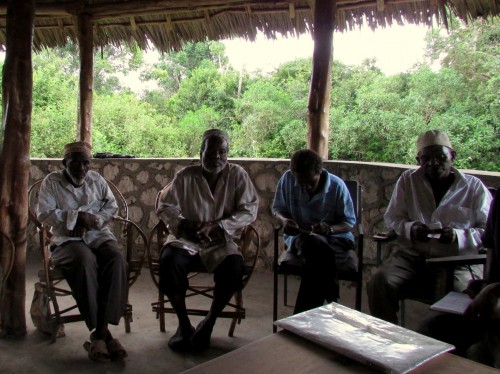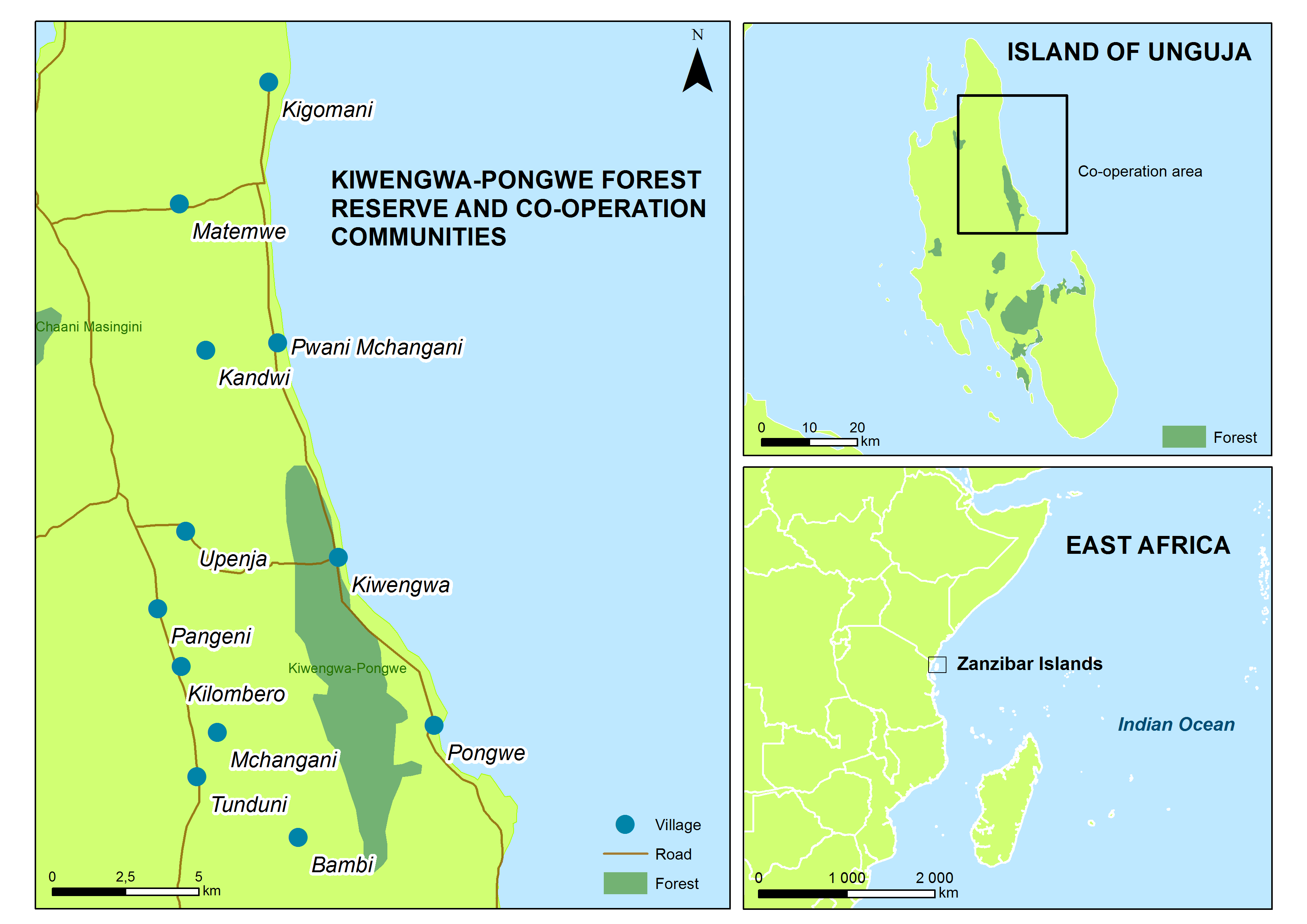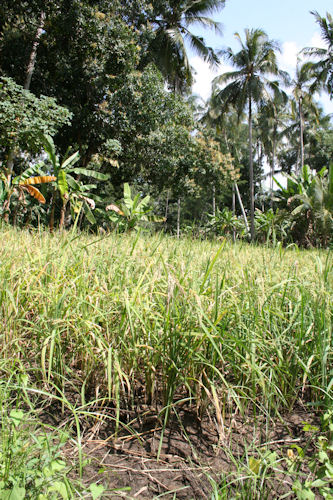Project description
KIPPO (Kiwengwa-Pongwe Protection & Open Civil Society) is a development cooperation project between Finland and Zanzibar Tanzania funded by Ministry of Foreign Affairs of Finland. KIPPO aims to enhance forest protection in Kiwengwa-Pongwe Forest Reserve in North-Eastern Unguja, Zanzibar, and to capacitate a young civil society organisation focused in forest conservation, MUMKI (Mtandao Wa Uhifadhi Wa Mazingira Kiwengwa-Pongwe).

KIPPO begun in 2017, and is a three year project ending in 2019. The project partners are Turun Maantieteellinen Seura (Geographical Society of Turku, GST) based in Turku, Finland, public funded Department of Forestry and Non-Renewable Resources of Zanzibar (DFNR), and MUMKI. GST and DFNR have coordinated three projects earlier, but for the first time MUMKI a third party has been involved in project implementation.
KIPPO aims to empower communities in forest protection and especially aims to ensure the participation and involvement of women in project activities. MUMKI is our main implementing partner. However currently lacking capacity to transparently run a project, we have included the DFNR to assist us on project implementation. As the project moves forward MUMKI will take more and more responsibility on the project implementation and in the last year 2019, they will identify beneficiaries and run a small development project by themselves. In three years cycle the focus will move from capacitation (start) to community based activities in the end.
Central project activities include training (in forest protection, gender mainstreaming, management & accounting, IT skills etc.), office establishment and other forms of material capacitation of MUMKI, funds for village level activities such as awareness events (organised by MUMKI), tree planting and support for livelihoods.
In three years we aim to achieve enhanced forest protection, transparent and increased involvement in participatory forest management of Kiwengwa-Pongwe, increased female participation through role models and established foundations for democratic open civil society in the community which can assist and support communities around Kiwengwa-Pongwe area.
Zanzibar and project area
Kiwengwa-Pongwe Forest Reserve situates in North-Eastern Zanzibar, Unguja, and was founded in the early 2000’s. 11 villages surround the forest reserve, however even more remote villages affect the management and condition of the natural forest area.

Zanzibar, or Unguja, is densely populated island, with an area just over 1600 km2 and almost 1 million inhbitants. 95 per cent of people use fire wood as primal energy source thus inflicting high pressure on forest areas. Rural Zanzibarians’ income and livelihoods are dependent on forests, which contributes to loss of forested areas of about 1-2- per cent per annum.
Kiwengwa-Pongwe is a participatorally managed forest reserve, which means, that the 11 villages surrounding the forest have been directly involved in the management of the forest. Each village has a Village Conservation Committee, which comprises of volunteers who participate in forest protection of forest such as tree planting, firefighting and patrolling in the forest in cooperation with local authorities. MUMKI, is an umbrella organisation of these 11 forest conservation committees.
Forest protection faces difficulties as people are dependent on forest related livelihoods and lack of firewood and poverty is causing lack of opportunities. When Kiwengwa-Pongwe Forest Reserve was established each city was granted a plot of village specific community forests where collection of firewood is permitted. However as lack of firewood and poverty are widespread, further villages exploit other villages’ community forests thus causing tension between different villages.
Project parties
KIPPO project has three project parties, one in Finland and two in Zanzibar. The project is funded by the Ministry for Foreign Affairs of Finland’s support for non-governmental organizations’ (NGO) development cooperation. In Zanzibar the project parties are GST’s long time partner from the previous projects, DFNR (Department of Forestry and Non-Renewable Natural Resources), and a young local NGO , MUMKI (Mtandao Wa Uhifadhi Wa Mazingira Kiwengwa-Pongwe).
Turun Maantieteellinen Seura TMS (Geographical Society of Turku)
Geogrpahical Society of Turku (GST) is a NGO based in Turku, Finland. It was founded in 1961 to work as a link between geographers and people interested in geography and to promote scientific geographic research. GST has strong ties to the Turku University and the geography department through research in Zanzibar and Tanzania and providing the students and staff an opportunity to participate in the GST activities and project work. From 2006 GST has ran three development cooperation projects in Tanzania: KIWA (https://blogit.utu.fi/tmsry/kiwa/), LIVE (https://blogit.utu.fi/tmsry/live/), SUFO (https://blogit.utu.fi/tmsry/sufo/) with KIPPO being the fourth (http://kippoproject.wordpress.com/). In KIPPO project GSTdeals with the project coordination in Finland, including following the budget and reporting to the donor (MFA), collecting self financing and organizing awareness raising etc. and assists zanzibarian partners in project implementation where necessary.
Department of Forestry and Non-Renewable Natural Resources (DFNR)
DFNR, which is a government department, has been a partner of GST in previous projects (KIWA, LIVE, SUFO) as well. DFNR represents the local government and forest administration and is the main actor in the project area for forestry and sustainable resource use. DFNR is well aware of the local working conditions and the best practices and guidelines in forestry, conservation and environmental issues. DFNR also has good contacts to the local communities and different related actors. DFNR has the supporting and facilitating role in building up MUMKI’s capacity to participate effectively in the K-PFR matters. In KIPPO DFNR assists MUMKI in project activities implementation and is giving crucial monitoring support for GST in order to report transparent fund spenditure in Zanzibar.
Mtandao Wa Uhifadhi Wa Mazingira Kiwengwa-Pongwe (MUMKI)
MUMKI is a Civil Society organisation founded in 2013, and registered a year later. MUMKI is an umbrella organisation for local village level forest conservation committees (FCC’s or VCC’s) and they participate in forest protection activities and awareness raising in the Kiwengwa-Pongwe Forest Reserve area. MUMKI thus works as a crucial link between the village areas and helps organising forest protection activities. MUMKI board members consist of VCC members. MUMKI has had problems with limited material capacity and knowledge, the development of which is one of KIPPO’s main objectives. MUMKI is to be the main implementing partner in Zanzibar, but during the start assistance and guidance of DFNR is necessary for the organisation to start working properly. MUMKI participated somewhat already during the previous GST&DFNR project, SUFO (Sustainable Forest Use and Food Security, https://blogit.utu.fi/tmsry/sufo/).
Objectives
KIPPO (Kiwengwa-Pongwe Protection & Open Civil Society) project’s main goal is the sustainable and democratic use of forest resources in the Kiwengwa-Pongwe Forest Reserve (K-PFR), Zanzibar, Tanzania. KIPPO is supporting this goal through the strengthening of local civil society and improving the networking and participation of different actors in the area. KIPPO supports Zanzibar’s Strategy for Growth and Poverty Reduction’s (ZSGPR/MKUZA II) objectives in growth and income poverty reduction, social well-being and good governance. The project supports the Sustainable Development Goals 2015-2030, especially in the form of the goal 15: “Protect, restore and promote sustainable use of terrestrial ecosystems, sustainably manage forests, combat desertification, and halt and reverse land degradation and halt biodiversity loss”.

Building base for community empowerment and civil society participation
The densely populated main island of Zanzibar, Unguja, is facing problems with forest degradation and the natural resources are under growing pressure due to population growth. Local communities depend on the forest resources directly, as in fuelwood and building material, but also indirectly, as forests are preventing erosion and supporting agriculture which is an important livelihood for rural communities. The project is focusing to the north-eastern part of Unguja island in Zanzibar, around the Kiwengwa-Pongwe Forest Reserve (K-PFR).The K-PFR represents the remaining natural forests in Unguja, and it is protected by DFNR together with local communities through community forest management agreements (CoFMA). In order to enhance the forest protection and sustainable forest use, KIPPO project is supporting the local NGO MUMKI to become an independent and more efficient partner and actor in the forest protection issues of K-PFR area. DFNR will benefit from the growing experience of working with civil society organizations and project management skills.
Through the support to MUMKI the project is supporting civil society and democratic decision making in the K-PFR area with the aim of everybody being able to participate in decisions that affect their living environments and livelihoods. Also DFNR will benefit from an efficient local partner that can participate in the forest protection activities of K-PFR and coordinate the activities of the village committees in the Kiwengwa-Pongwe area as well as support the community level forest management activities. During the KIPPO project MUMKI will continue to take on more responsibility and they will organize some of the project activities, which has previously been solely DFNR’s responsibility.
Trainings will increase MUMKI’s management capacity in regards to planning and reporting. With the support of the project MUMKI will also find ways to include gender awareness in their activities and support equality in their organization. Trainings will also cover issues in forest protection, sustainable management and enhance MUMKI’s capacity to take an active role among the village committees and in the forest protection activities. Investing in the funding sources of the organization will benefit the organization in the long run and create independence.
Local networking and activities in the K-PFR communities are important to ensure the continuing success of MUMKI. Creating contacts will support information exchange among different actors in regards to forest protection, community development and cooperation of civil society with businesses and official actors. Cooperation of different actors is very limited in general at the beginning of the project.
Investments in the material capacity of MUMKI will support them in their daily activities and outreach to the communities. Establishing a functioning office will speed up the organization of activities and provide a place to meet, to store their materials and tools. Transport is needed in order to continue efficient awareness raising in the whole area and having transport available will also improve MUMKI’s ability to participate in forest patroling activities and networking.
Reports, publications and other materials
KIPPO project info and blog
2017: Initial project plan, report from the starting seminar
2018:
2019:
You can join KIPPO email-list if you are interested to hear in more detail what is going on and how you can participate.
